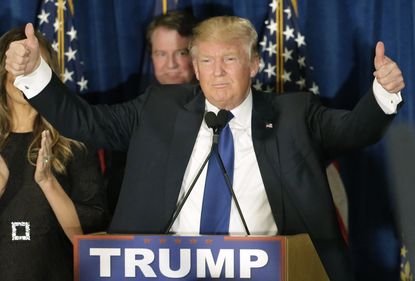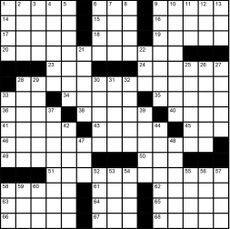There are only two paths left for the GOP: Chaos or catastrophe
And right now, either looks equally possible


Coming out of New Hampshire, the Republican Party faces two possible scenarios: chaos or catastrophe.
Right now, either looks equally possible.
Let's start with the chaos.
Subscribe to The Week
Escape your echo chamber. Get the facts behind the news, plus analysis from multiple perspectives.

Sign up for The Week's Free Newsletters
From our morning news briefing to a weekly Good News Newsletter, get the best of The Week delivered directly to your inbox.
From our morning news briefing to a weekly Good News Newsletter, get the best of The Week delivered directly to your inbox.
Perhaps the biggest question going into the New Hampshire primary was whether Donald Trump would match, fall short of, or surpass his polling numbers. He fell several points short in Iowa, leading many analysts to conclude that his support could be soft, with voters willing to express enthusiasm for Trump to pollsters, but balking at the prospect of actually voting for him.
New Hampshire failed to make it a trend. Trump finished with about 35 percent of the vote — which is pretty much at or slightly above where he'd been polling over the past week. And that might indicate that his considerable support in upcoming states is solid. If so, Tuesday's victory will be followed by several more over the coming weeks.
But that's exactly what most analysts and pundits have been predicting for quite a while — even many of those who have remained broadly bearish on Trump's chances. So what else is new?
This: complete disarray among the other candidates. Had Cruz come in a strong second — say, around 30 percent to Trump's 35 — that would have combined with his victory in Iowa to make him the clear alternative to Trump. Likewise, had Rubio given Trump a run for his money, that would have built on his surprisingly strong third-place showing in Iowa to make him, if not the definitive non-Trump option, then at least a strong contender to battle Cruz for that distinction in the upcoming Nevada caucus, South Carolina primary, and beyond.
Instead, the GOP ended up with a perfect storm of indecisiveness. Besides Trump, no candidate inspires as much derision among rock-ribbed conservatives as John Kasich, who came in a wan second place with 16 percent, fewer than half as many votes as Trump. Then came last week's wunderkind, Ted Cruz, who barely managed to come in ahead of Jeb "Please Clap" Bush and everyone's favorite robot, Marco Rubio.
It already looks like Chris Christie's sixth-place showing is going to drive him from the race. The same will soon likely be true of Carly Fiorina and Ben Carson, who brought up the rear. But the top five finishers? It's hard to see why any of them would quit on the basis of their performances so far.
Cruz can pin his hopes on the South, and especially his delegate-rich home state of Texas, which votes on March 1. Rubio can continue to believe that despite the scorching humiliations of the last week, he's the frontrunner-in-waiting that so many establishment Republicans desperately want him to be and thought they saw emerging on the night of the Iowa caucuses.
Kasich, meanwhile, certainly won't quit after ending up the runner-up. And that leaves Bush, who won't quit either — not after besting Rubio, his one-time protégé and present-moment bête noir. Bush still has money and a flush super PAC on his side. Had he finished in the basement in New Hampshire, he would have quit in abject embarrassment. But now he'll have a chance, if not to win, then at least to bow out later on with a smidgen of his honor intact.
And that, my friends, is a perfect storm of chaos: Trump riding high, but not high enough to best the non-Trump vote, while the non-Trump vote remains badly splintered, with no movement at all toward clarifying which single candidate might emerge to challenge him, and the various options training their fire (and tidal waves of negative ads) on each other.
For the past several months, the smartest of the Trump doubters have based their case on Trump's relatively low ceiling of support. Yes, he's leading the polls in a very crowded field, but that ceiling (never higher than the mid-30s) is unlikely to go much higher, and certainly not past a majority in any state. As soon as the non-Trump vote falls in behind an establishment candidate, he'll be beaten.
But what if that doesn't happen before the GOP primaries become winner-take-all in mid-March? In that case, Trump is going to start piling up an awful lot of delegates, even if his share of the popular vote never rises above 40 percent. That might not be enough to clinch the nomination, but it would be enough to give us the most riveting political convention in a very long time.
Who would emerge from the chaos in Cleveland? Trump? Cruz? Rubio? Bush? Paul Ryan? Mitt Romney? It could be any of them. Or someone else not currently on anyone's radar screen.
But there is, of course, another possibility: the catastrophe of Donald Trump winning the nomination outright and competing head-to-head with the Democratic nominee to become president of the United States.
For that to happen, he'd probably need several of the non-Trump options to remain in the race through March, a significant number of their supporters to pull the lever for him when their first choice does drop out, and (most ominously) substantial numbers of Democrats to vote for him in those states that have open primaries (including South Carolina, Alabama, Georgia, Tennessee, Texas, Vermont, Virginia, Michigan, Illinois, Missouri, Wisconsin, and Indiana).
The first scenario looks likely. The second and third somewhat less so. But we just don't know.
Just as we don't know the outcome of a general election contest that pitted a demagogic megalomaniac against Hillary Clinton or Bernie Sanders.
Or what he would do once elected to the most powerful job in the world.
Create an account with the same email registered to your subscription to unlock access.
Sign up for Today's Best Articles in your inbox
A free daily email with the biggest news stories of the day – and the best features from TheWeek.com
Damon Linker is a senior correspondent at TheWeek.com. He is also a former contributing editor at The New Republic and the author of The Theocons and The Religious Test.
-
 The hunt for Planet Nine
The hunt for Planet NineUnder The Radar Researchers seeking the elusive Earth-like planet beyond Neptune are narrowing down their search
By Chas Newkey-Burden, The Week UK Published
-
 Magazine interactive crossword - April 26, 2024
Magazine interactive crossword - April 26, 2024Puzzles and Quizzes Issue - April 26, 2024
By The Week US Published
-
 Magazine solutions - April 26, 2024
Magazine solutions - April 26, 2024Puzzles and Quizzes Issue - April 26, 2024
By The Week US Published
-
 Arizona court reinstates 1864 abortion ban
Arizona court reinstates 1864 abortion banSpeed Read The law makes all abortions illegal in the state except to save the mother's life
By Rafi Schwartz, The Week US Published
-
 Trump, billions richer, is selling Bibles
Trump, billions richer, is selling BiblesSpeed Read The former president is hawking a $60 "God Bless the USA Bible"
By Peter Weber, The Week US Published
-
 The debate about Biden's age and mental fitness
The debate about Biden's age and mental fitnessIn Depth Some critics argue Biden is too old to run again. Does the argument have merit?
By Grayson Quay Published
-
 How would a second Trump presidency affect Britain?
How would a second Trump presidency affect Britain?Today's Big Question Re-election of Republican frontrunner could threaten UK security, warns former head of secret service
By Harriet Marsden, The Week UK Published
-
 'Rwanda plan is less a deterrent and more a bluff'
'Rwanda plan is less a deterrent and more a bluff'Instant Opinion Opinion, comment and editorials of the day
By The Week UK Published
-
 Henry Kissinger dies aged 100: a complicated legacy?
Henry Kissinger dies aged 100: a complicated legacy?Talking Point Top US diplomat and Nobel Peace Prize winner remembered as both foreign policy genius and war criminal
By Harriet Marsden, The Week UK Last updated
-
 Trump’s rhetoric: a shift to 'straight-up Nazi talk'
Trump’s rhetoric: a shift to 'straight-up Nazi talk'Why everyone's talking about Would-be president's sinister language is backed by an incendiary policy agenda, say commentators
By The Week UK Published
-
 More covfefe: is the world ready for a second Donald Trump presidency?
More covfefe: is the world ready for a second Donald Trump presidency?Today's Big Question Republican's re-election would be a 'nightmare' scenario for Europe, Ukraine and the West
By Sorcha Bradley, The Week UK Published